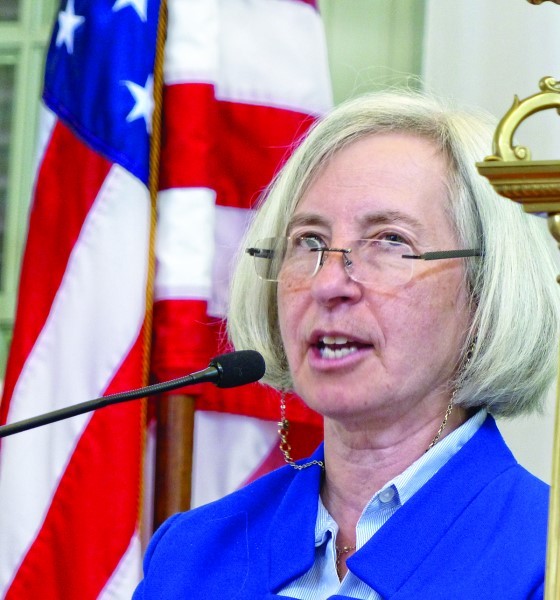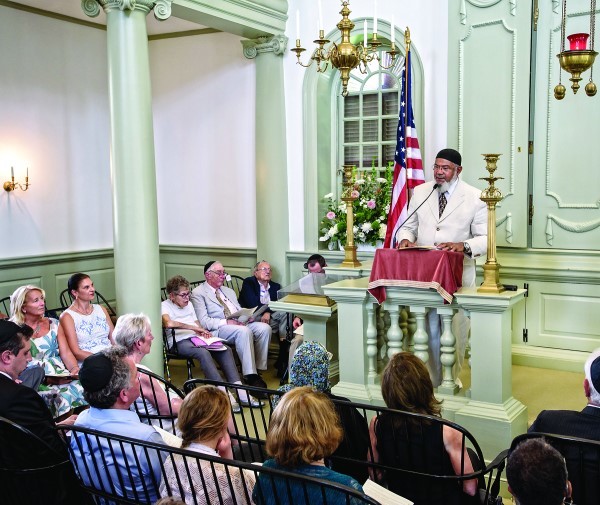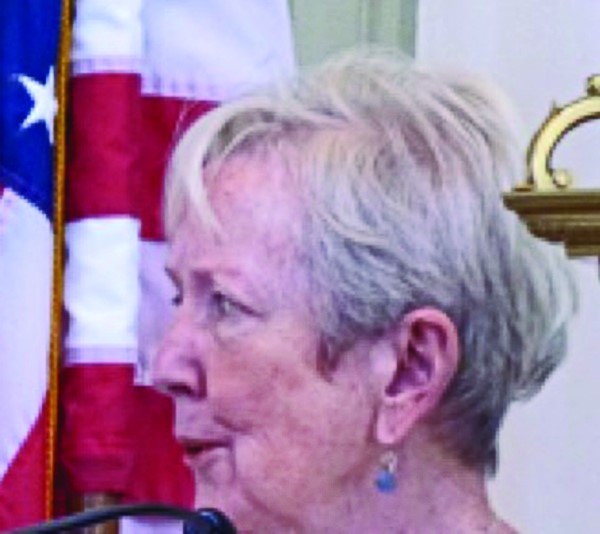George Washington letter resonates at annual reading
NEWPORT – On this remarkable Aug. 20, about 200 people participated in a ceremony at the Touro Synagogue in which a Catholic nun and Muslim imam played leading roles. During this annual event, President George Washington’s 1790 letter to the “Hebrew Congregation” of Newport is read and celebrated. Listeners were implored to be “upstanders” rather than bystanders in times like the present.
Sister Jane Gerety, president of Salve Regina University, in Newport, gave the invocation and noted that the promise of the first president is being unraveled by the current one. Sister Jane paraphrased Washington’s words in the negative, noting that we are not able to sit in safety under our own vine and fig tree, and there are those who will make us afraid. But she also said that hope is at hand with events like the one at Touro and in Boston, where 40,000 who marched there protested bigotry and the persecution of minorities.
The same theme was sounded by Rhode Island General Treasurer Seth Magaziner, who recounted a personal and frightening brush with anti-Semitism and noted that our leaders must not draw moral equivalency between Nazis and those who protest against hatred. Magaziner went on to note that Rhode Island has been a bastion of religious freedom as the first state to open its doors to many faiths and creeds.
Imam Farid Ansari of the Muslim American Dawah Center of Rhode Island had the honor of reading aloud the letter from the Hebrew Congregation of Newport that prompted Washington’s letter in reply.The initial letter, written in 1790 by Moses Seixas, an official of the congregation, focuses on the themes of religious freedom and equality of citizenship for all. The imam, just prior to his reading of Seixas’ letter, stated, “Having a Muslim participate in a synagogue; what better sign to the world than this?”
Washington’s letter, which was read by Stephen B. Kay, senior director, Goldman Sachs & Co. and a descendant of prominent 19th-century Newport Jews, includes the most famous words penned by Seixas: “Deprived as we heretofore have been of the invaluable rights of free Citizens, we now (with a deep sense of gratitude to the Almighty disposer of all events) behold a Government, erected by the Majesty of the People – a Government, which to bigotry gives no sanction, to persecution no assistance – but generously affording to All liberty of conscience, and immunities of Citizenship: deeming every one, of whatever Nation, tongue, or language, equal parts of the great governmental Machine…”
Following the reading of these letters, Martha L. Minow, Carter Professor of General Jurisprudence, Harvard Law School, gave the keynote address. Minow called attention to the distinctions between the utterances from our first president and the current occupant of the White House. She began her address by stating: “Sadly, the annual reading of President George Washington’s letter to the Hebrew Congregation in Newport is vital at this moment. The whole nation, including the current president, the holder of our public trust, needs to remember and reclaim the founders’ vigilance against bigotry. A bigot, says the dictionary, is one who regards or treats the members of a group (such as a racial or ethnic group) with hatred and intolerance.”
Minow noted that many congregations wrote to George Washington, including Savannah, New York, Philadelphia, Charleston and Richmond. But it was the Newport congregation that prompted a presidential response. Indeed, this was a time when states were ratifying the US Constitution, and although Rhode Island was the last to ratify, it had already embodied principles of religious freedom in its own state constitution. “As if in dialogue with him, Rhode Island ratified the Constitution in May of 1790 – before passage of the Bill of Rights and guarantee of freedom of religion – and then the president agreed to come visit,” said Minow.
At the end of her presentation, Minow said we need a response in the face of bigotry. We cannot be mere bystanders but instead we need to be “Upstanders,” she said, coining a word that does not yet seem to have translations in other languages. She declared that “the term ‘upstander’ gives recognition and approval to people who stand up for their beliefs, even if they are alone; it means not being a bystander.”
Minnow concluded by telling the audience that George Washington, although flawed, a slaveholder and a “control-freak,” was an upstander, and so was Moses Seixas. “Let’s see how we each can engage in respectful discussion and stand up for the values exemplified in their exchange.” Her address was greeted with sustained applause from the audience.
The congregation then adjourned to Patriots Park for a festive meal and the unveiling of a new monument with Moses Seixas’ words alongside those of President George Washington.
SAM SHAMOON, of Providence, is a member of the Touro Synagogue Foundation Board of Directors.













